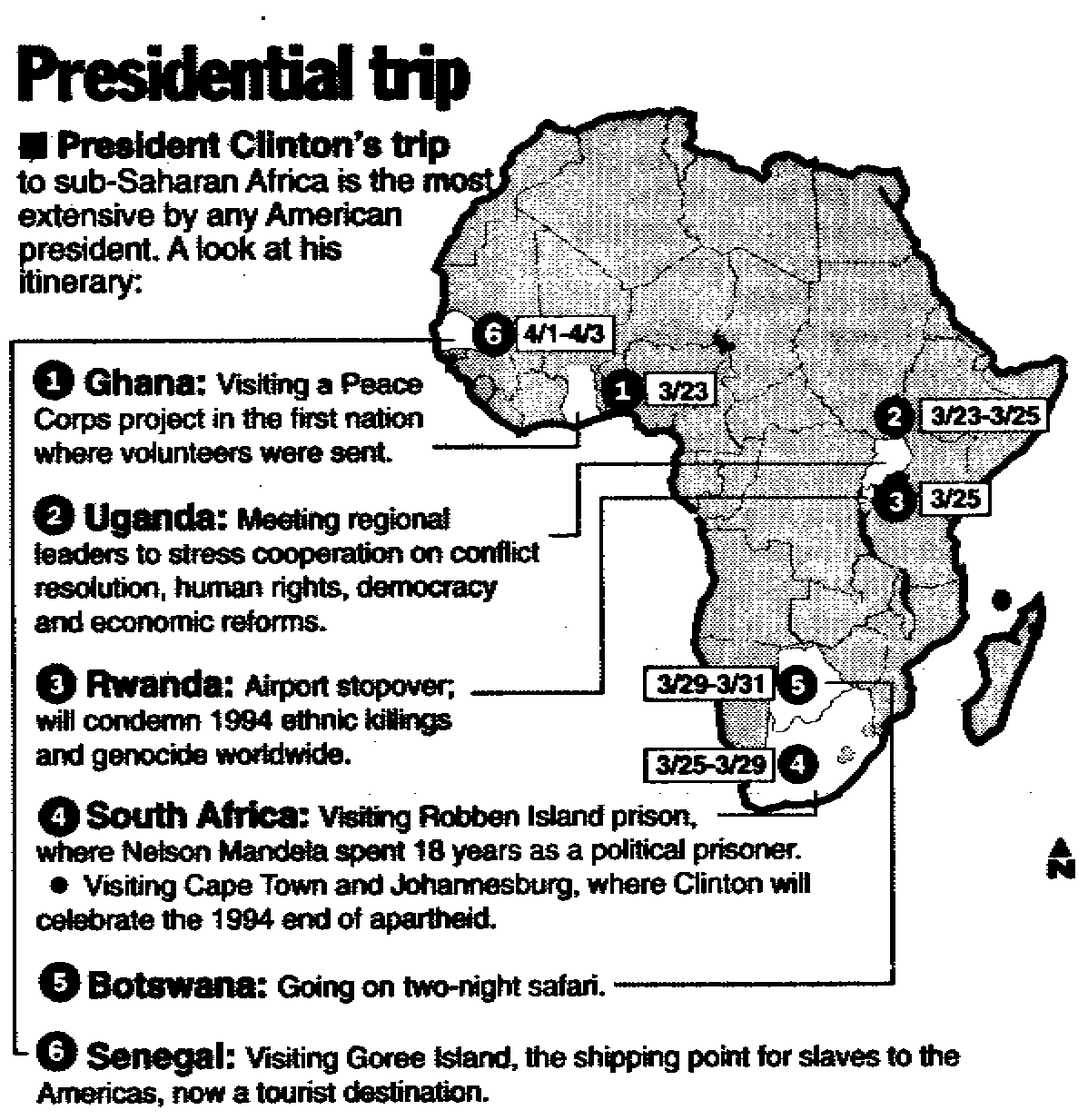
Extensive Africa tour is a first for any U.S. president
Clinton trip makes history
'It's not a jungle. It's not bodies floating down rivers. It's a vast and diverse continent,' says one U.S. official.
By JODI ENDA
KNIGHT-RIDDER NEWSPAPERS
Bill Clinton is the first president to attempt to
introduce Africa to Americans whose views of the continent have been molded by gruesome
television footage featuring people who are starving, diseased or dead.
By visiting urban centers, new businesses and schools, Clinton will
show that "Africa is not a backwater," Susan Rice, assistant secretary of state
for Africa, told members of Congress last week. "It's not a jungle. It's
not bodies floating down rivers. It's a vast and diverse continent, where people are
doing their very best to achieve their potential and where there are exciting
opportunities for American investment."
Clinton's Longest Tour
Even critics laud Clinton for taking the trip, the
longest foreign tour of his presidency. Only three other sitting presidents have
been to Africa, all of them briefly, according to the National Security Council. George
Bush reviewed U.S. troops in Somalia in 1992. Jimmy Carter whisked through Liberia
and Nigeria during three days of 1978. And Franklin D. Roosevelt met Winston
Churchill off the coast of Gambia, then a British Colony, in 1943.
But detractors charge that the administration's hopeful rhetoric about
a new Africa is not backed by the kind of dollars that will be necessary to make a real
difference. In 1992, the United States contributed $840 million toward development
in Africa; this year, it is spending $700 million and the administration has requested an
additional $30 million for 1999, according to the administration.
Brian Atwood, of the U.S. Agency for International Development,
conceded that the $1.3 billion the United States sends to sub-Saharan Africa in the form
of development and humanitarian aid is "less than a penny a day per American and less
than a B-2 bomber."
"The rhetoric and the framing of the issue is fine, but the
resources needed to make a serious new start in Africa are simply not there," said
Salih Booker, director of the Africa Studies Program at the Council on Foreign Relations.
Administration officials counter that they are committed to Africa, not
only through direct aid, but also in the burgeoning area of trade.
One recurrent theme of Clinton's trip will be support for a bill,
passed by the House this month, which is intended to increase trade and investment between
the United States and countries that establish marketbased economies.
Opponents say that the bill will hurt Africa by supplanting aid with
trade, and that it will cost American jobs - charges the administration disputes.
Besides the trade issue, Clinton will press for ways to end ethnic
conflicts, speed movement toward democracy, improve human rights and increase economic
cooperation during a meeting with several African leaders in Entebbe, Uganda.
Worries About Scandal
A tricky part of the trip will come in South Africa,
when Clinton is scheduled to hold a news conference with President Nelson Mandela.
Aides say Clinton views the elder Mandela as a real-life hero, a victor
in the long struggle against apartheid, who has successfully negotiated a peaceful shift
to democracy.
But as the two leaders stand before reporters, aides fear Clinton will
be dogged with questions about the sex scandal at home, an embarrassing personal issue
that could eclipse the president's attempt to forge a new relationship with much of a
continent.
The otherwise well-orchestrated trip, on which the president will be
joined by first lady Hillary Rodham Clinton, will include some powerful and emotional
moments dealing with some of the more shameful pieces of Africa's distant - and recent -
past.
In Rwanda, Clinton will meet with survivors of the 1994 ethnic
slaughter that killed more than 500,000 people and forced 2 million more to flee.
During a trip to the region in December, Secretary of State Madeleine
Albright apologized to African leaders for the world's failure to stop the genocide.
In South Africa, Clinton will visit Robben Island with Mandela, who was
jailed there for two-thirds of the 27 years he was held as a political prisoner. Clinton
will end his trip with a speech on Goree Island, Senegal, where, for nearly three
centuries, Africans lived in bondage until they were herded onto slave ships heading for
the Americas.
On the lighter side will be a photo safari in Botswana and a visit with
Peace Corps workers in Ghana, the first nation to receive volunteers when the program
began in 1961.

Des Moines Register
Sunday, March 22, 1998, Page 3A
letters@news.dmreg.com